1865 – Johannes A. Endter
Johannes Adolph Endter was born on May 1, 1865 (January 15, 1865 according to Eden Seminary records) in the village of Albrechts, near the town of Suhl, in Provenz Thüringen, (the province of Thuringia) Königreich Preußen (Kingdom of Prussia). Albrechts is about 35 miles southwest of the Thüringen capital of Erfurt. Today the village is in Freistaat Thüringen (the Free State of Thuringia) in central Germany.
I have no record of Johannes Endter’s parents. However, a sister, Julia M. Endter (also listed as Juline or Juliane Endter) was born in April 1874, nine years after Johannes. She emigrated to the United States in 1893, about a year or two after John and had settled in California by 1900. John Endter has moved to California to serve his first parish in 1896. In 1900, Julia was working as a servant in Pacific Grove, Monterey, California. In 1920, she was working as a maid in San Francisco at age 45. She apparently never married.
The Luhr Library at Eden Theological Seminary in Webster Groves, Missouri has a rare bible in their collection—an edition of Luther’s translation dated 1686 and published in Nürnberg (Nuremberg) by Johann Andrea Endter. Perhaps there is a family connection although Johannes A. Endter was born 200 years later.
The various Thüringian duchies which became part of the German Empire in 1871 were Saxe-Weimar-Eisenach, Saxe-Meiningen, Saxe-Altenburg, Saxe-Coburg-Gotha, Schwarzburg-Sondershausen, Schwarzburg-Rudolstadt and the two principalities of Reuß. In 1920, after World War I, these small states merged into one state, called Thüringen. I haven’t identified which duchy that the towns of Albrechts and Suhl were a part of.
Das Evangelishes Johannesstift Berlin
According to his obituary, Johannes Endter was educated at the diaconal school of Das Evangelishes Johannesstift Berlin (the Evangelical Johannes Foundation in Berlin).
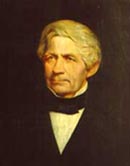
The Johannesstift school and related social service institutions were founded by Johann Hinrich Wichern (1808-1881) one of the early proponents of Inneren Mission, or pastoral care, in the Prussian Evangelical Church. He was heavily influenced by Pietist thinkers who taught him that Christ cared deeply for the poor.
Wichern came into contact with the situation of abandoned children and young people during his theological studies in Hamburg, when he earned his living as a teaching assistant in a student boarding school. The educational and practical experience he gained there, led to the foundation in 1833 of the Ruges Haus (Rough House) in the shanty town of Hamburg-Horn on the outskirts of Hamburg.
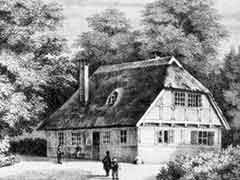
The name derived from a rough hut which stood on the property. At Ruges Haus, Wichern believed he could rescue children from poverty and moral decay by teaching reading. He created a boarding school to provide neglected children and young people a home in a compassionate spiritual community, and to provide educational training.
By the early 1850s, Wichern was especially interested in conditions in the Prussian prison system. This brought him into contact with Kaiser Friedrich Wilhelm IV, who appointed Wichern as an adviser on social affairs in Berlin, and charged him with promoting prison reform in Prussia. A central idea of this reform was to provide group rehabilitation for the prisoners rather than a sentence of solitary confinement.
The Kaiser approved of Wichern’s reforms and suggested that he start a Prussian training center for deacons with social responsibilities. Wichern took up this proposal and on April 25, 1858, he founded the Evangelishes Johannesstift Berlin (the Evangelical Johannes Foundation in Berlin). The first intention was to train deacons to provide social work for prisoners. The education of children and adolescents became part of the program shortly after, and soon became the foundation’s primary focus.
At the inauguration of the foundation, Johann Hinrich Wichern stated that the purpose was the training of deacons for service to others.
“The Johannesstift in Berlin aims to gather Evangelical men for working among the poor, the sick, prisoners, children, and among the people of the German Evangelical Diaspora, and to prepare for this service of brotherly love through education and practical training.”
The foundation was able to buy an area of 30 hectares (75 acres) on the Plötzensee, a small lake in Berlin, now part of the Rehberge park. Thirty buildings were constructed there from 1864 to 1900. In 1906, the city of Berlin asked to purchase the property to create a major inland port and in 1910 the Johannesstift moved to its current location on a 75-acre wooded estate in the Spandau Forest.
It was here that Johannes Endter received his initial training for the ministry.
emigration and theological education
After his diaconal training, he embarked on the ministry to the “German Evangelical Diaspora” and emigrated to the United States in 1891 or 1892.
Johannes Endter received his theological education at Eden Seminary in Wellston, Missouri, graduating in 1895.
Die Deutsche Evangelische Synode von Nord-Amerika
When he arrived, Eden Theological Seminary was training pastors for Die Deutsche Evangelische Synode von Nord-Amerika (German Evangelical Synod of North America) formed from a merger of several German Evangelical synods in the United States in 1872. The Synod had its roots in a pastors’ association formed in 1840 at Gravois Settlement (now Mehlville, Missouri) and just ten years later they established a seminary, the Evangelischen Predigerseminar (Evangelical Preacher’s Seminary) near the town of Marthasville, in Warren County. By 1866, this German Evangelical pastor’s association grew to become Die Deutsche Evangelishe Synode des Westens (German Evangelical Synod of the West).
The various German Evangelical church bodies in North America traced their roots to Die Evangelische Kirche der Preußischen Union (the Evangelical Church of the Prussian Union) in Germany. It grew out of an early nineteenth century union between Lutheran and Reformed (Calvinistic) churches. In 1817, the Prussian king, Friedrich Wilhelm III, wanted a unified Protestant church and he issued a “Call to Union” to the two Protestant churches founded by Luther and Calvin. Part of his motivation was his grief that he had been unable to receive communion with his late wife because she was Lutheran and he was Reformed. In 1817, the Lutheran and Reformed traditions were united into one state church—Die Evangelische Kirche der Preußischen Union, or the Evangelical Church of the Prussian Union. Later this church was called Die Evangelische Kirche der Altpreußischen Union (the Evangelical Church of the Old Prussian Union).
The name Evangelical, which simply means “of the gospel,” was a political compromise between the two theological traditions. In the nineteenth century, the term Evangelical indicated a blending of Lutheran and Reformed traditions. In the United States however, the Evangelical churches were predominantly Lutheran in practice and custom.
Eden Seminary in Wellston, Missouri
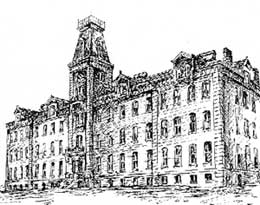
Eden Seminary was located on the western outskirts of Saint Louis in the town of Wellston. It was originally known as the Evangelischen Predigerseminar (Evangelical Preacher’s Seminary), the school that had been established by the preacher’s association in the summer of 1850 in a rural valley four miles east of Marthasville, Missouri. The location was isolated, and in October 1883, the seminary moved to Wellston, where the students had better access to transportation, libraries, and many German Evangelical churches. (In 1924, another relocation brought the seminary to its present location in Webster Groves, Missouri.)
In 1891, the College und der Theologischen Seminar der Deutschen Evangelischen Synode (College and Theological Seminary of the German Evangelical Synod) was situated on 19 acres fronting on St. Charles Rock Road at the intersection of Lucas and Hunt Road. Eden Station, a stop on the Wabash, St. Louis and Pacific Railroad was nearby. A streetcar could travel from the Eden Station to downtown St. Louis in 30 minutes. The students spoke of making the trip to Eden, and the name began to apply to their school which was soon known as “the seminary at Eden.”
It was an ironic name for a place so rugged and austere. The men followed arigid schedule of lectures, dictation, and manual labor. They were only allowed to leave the seminary on Saturday afternoons, and they were forbidden to go to the theater or a saloon or to have anything to do with women. All classes were in German. There was a gradual relaxation and modernization over the years. English was introduced in the 1890’s and students were allowed to become engaged in 1900.
Johannes Endter graduated from Eden Seminary in 1895.
ordination at Die Deutsche Evangelische St. Pauls Gemeinde
Johannes Endter was ordained on June 16, 1895 at Die Deutsche Evangelische St. Pauls Gemeinde, (St. Paul’s Evangelical Church) on Ninth Street in the Soulard neighborhood of St. Louis, Missouri. Today, the congregation is St. Paul United Church of Christ, 3510 Giles Avenue, St. Louis, MO 63116 (314-772-4772) ( Rev. Tom Ressler – stpauluccsec@att.net)
When the Rev. Adolph Baltzer, an orthodox pietist, resigned as pastor of St. Marcus Church over issues of church discipline, he and his supporters founded St. Paul Church on October 23, 1848. According to the constitution, only Christians expressing a life of faith lived according to the Word of God and willing to conform to the discipline of the congregation would be admitted as members.
Worship services were first held in the pastor’s house at 9th St. south of Soulard on Dec. 31, 1848. A new church, dedicated on the same site on Feb. 17, 1850, included the parochial school and living quarters for the pastor and school teacher. A larger church was dedicated on the same site on Nov. 8, 1874 and expanded again in 1875. After the May 27, 1896 tornado destroyed its building, the congregation rebuilt and dedicated its new church on Palm Sunday in March 1897.
Rev. Jacob Irion was pastor of St. Paul’s from 1882 to 1922.
Johannes (John) Endter married Louise Sagner on May 13, 1896 at Eden Evangelical Church in Mount Eden, Alameda, California which was his first parish following his ordination. He met Louisa Sagner in St. Louis while studying at Eden seminary.
1864 – Louise Sagner
Louise Emilie Sagner was born on October 7, 1864 in the town of Meseritz located in Kreis Meseritz (Meseritz county) in Provinz Posen of Königreich Preußen (the Kingdom of Prussia). She was baptized at the Evangelical church on October 23, 1864. Her parents were August Sagner and Ernestine Kurtzhan. Today the town of Meseritz is in Poland and is called Międzyrzecz.
Louise had younger two siblings, Gustav and Anna. In 1869, when Louise was only five years old, her father left for America, settling in St. Louis, Missouri.
In 1884, when she was 20, Louise Sagner emigrated to America with her brother Gustav, preceding her mother and sister Anna by one year. Her father, August Sagner, a carpenter, had been separated from his wife and family for nearly 16 years. During the intervening years census records record him as living with a “wife” named Christine. She disappeared from the scene when August’s real wife Auguste Ernestine (Ernestine) Kurtzhan arrived in St. Louis in 1885.
dressmakers
Louise (or Louisa) and her younger sister Anna were both dressmakers. The Gould’s St. Louis City Directory for 1893 listed “L & A Sagner Dry Goods” at 4203 Clay Avenue. Following that in the directory were listings for Louisa and her sister “Annie” Sagner with their company name and address (L & A Sagner Dry Goods, 4203 Clay Avenue) following their individual names. They apparently lived at the address where they operated their business. Unfortunately, the dry goods store did not last long. In 1895, the sisters were working at separate addresses. Gould’s St. Louis Directory for 1895 listed Louisa Sagner, a dressmaker, employed at 3040 Marcus Avenue in St. Louis.
marriage to pastors
Louise and Anna Sagner both married pastors. On May 13, 1896, Louise Sagner married Rev. Johannes (John) A. Endter in Mount Eden, Alameda, California. Six years later, on August 13, 1902, her sister Anna Augusta Sagner married Rev. Gustav Adolf Zimmer in Denver, Colorado. Both men had attended Eden Seminary. (See Gustav Zimmer and Anna Sagner)
Louisa’s father August Sagner died on December 5, 1899 in St. Louis, Missouri. He was buried at Die Deutsche Evangelische Zions Friedhof (the German Evangelical Zion’s Cemetery) at 7401 Saint Charles Rock Road in St. Louis. St. Charles Rock Road runs through the town of Wellston.
This leads me to speculate that the Sagner family may have belonged to Die Deutsche Evangelische Zions Gemeinde (the German Evangelical Zion Congregation), located in Old North St. Louis, an area just to the north of the downtown district. The congregation was founded in 1868 at 23rd & Montgomery streets. In 1872, it relocated to a new brick church at 2506 Benton at the corner of 25th street. (Today, the congregation is Zion United Church of Christ located at 5710 N. Hwy 67 in Florissant, Missouri.) The Zion cemetery was established in 1883 by the congregation. In 1887, the church was admitted to the Evangelical Synod of North America and in 1899, the church building was enlarged to meet the needs of a growing congregation.
The Sagner family lived about three miles west of the church. Eden Seminary in Wellston was another three to four miles west of the Sagner home. Since Zion was a German-speaking congregation of the Evangelical Synod, it is possible that both Johannes Endter and Gustav Zimmer worshipped there or even preached there as students.
marriage and children

On May 16, 1896, the San Francisco Morning Call carried this announcement of the wedding of the Rev. John Endter of Mount Eden and Louisa Sagner of Saint Louis, Missouri. They were married on May 13, 1896 at Union Church by the Rev. Paul Branke of San Francisco.
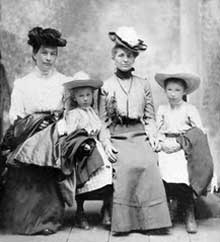
John and Louise Endter had seven children. Their first three were born in Woodland, California, the fourth was born in Oakland, California, and the last three in Nickerson, Kansas.
The photo at the left is of Louise and her mother Ernestine with the two eldest children Ruth (on right) and Anna (on left).
The Endter children were:
- Ruth Johanna Endter, born February 1897 in Woodland, Yolo, California
- Anna Louise Endter, born August 5, 1898 in Woodland, Yolo, California
- Johannes (John) Nathaniel Endter, born February 12, 1900 in Woodland, Yolo, California
- Theodor Gustav Friedrick Endter, born April 16, 1903 in Oakland, Alameda, California
- Esther Julia G. M. Endter, born September 14, 1904 in Nickerson, Reno, Kansas
- Gertrud Clara Emilia Endter, also born September 14, 1904 in Nickerson, Reno, Kansas
- Martha Augusta Endter, born June 3, 1906 in Nickerson, Reno, Kansas, and died October 8, 1907 in Nickerson, Kansas
parishes in California
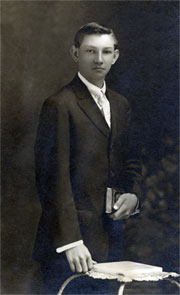
In 1895, after his ordination, Johannes Endter’s first parish was in Mount Eden, Alameda, California where he married Louise in May of the following year.
I checked with Hayward Eden United Church of Christ in Hayward, California which is located close to Mount Eden. The pastor there has confirmed that they are not the sucessor congregation to the Mount Eden church where John Endter served. He is not on their list of pastors. Unfortunately, his first parish has not survived.
It appears that at the same time (1895) he also served a mission congregation in Pleasanton, Alameda, California, about eight miles east of Mount Eden. This congregation also did not survive.
Then, from 1896 to 1897, Pastor Endter served at an unknown parish in San Rafael, Marin, California. Apparently, this congregation did not survive as well.
John Endter may have also served a congregation in Petaluma, Sonoma, California, because the history of his following parish in Woodland says that they called him from Petaluma. An Evangelical congregation was founded there in 1854. Today, it is Petaluma United Church of Christ, 825 Middlefield Drive, Petaluma CA 94952-5224 (707-763-2454).
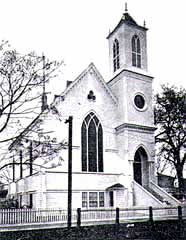
From 1897 to February 1900, Johannes Endter was the pastor of Die Deutsche Evangelische St. Johannes Gemeinde (the German Evangelical St. John’s Congregation) in Woodland, Yolo, California, founded in 1891. He was the congregation’s second pastor.
The sanctuary was built in 1892 by members of the congregation at a cost of $4,000. A two-story, nine-room parsonage was constructed on adjoining property a decade later, about two years after John Endter left the congregation. Both the church and the parsonage were destroyed by a fire in 1934.
Today, the congregation is St. John’s UCC, 432 Cleveland Street, Woodland, CA 95695 (530-662-5921). Of ten German Evangelical congregations formed in Northern California in the 1880s and 1890s, only two survived—St. John’s in Woodland and St. John’s in San Francisco.
Woodland is about 15 miles west and north of Sacramento. Many of the German settlers who formed the Woodland congregation were farmers who lived in the Dixon area southwest of Woodland and the Hungry Hollow area about 15 to 20 miles northwest of the town. (Hungry Hollow may have derived its name from two Hungarian farmers who first settled there—at first called Hungary Hollow, and then Hungry Hollow.) Some of the German farm families of Hungry Hollow had previously met for worship at the nearby Center School before becoming members of St. John’s in town.
For over 20 years (in articles dating from 1897-1923) the local newspaper, “The Woodland Daily Democrat,” referred to the congregation simply as the “German Lutheran Church” or the “Woodland German Church,” or the “German Church,” which at various times advertized Sunday services at 9:30 AM, 11:00 AM, and 7:30 PM.
This excerpt from a history of St. John’s UCC, describes what was required from a pastor of a largely rural parish in the first decade of the twentieth century:
While St. John’s had settled into its new house of worship, a great many of the Evangelical families lived on farms in Hungry Hollow and other outlying areas, so, the 15 to 20 mile buggy ride trip to Woodland in all kinds of weather and road conditions became a real test of Christian devotion.
Sometimes, such trips could just not be made, no matter how earnestly the families wished to worship in their church in Woodland every Sunday. So, it was decided, if the people could not come to church, the church would go to the people.
And so it became a ritual for the pastor to hook up his horse and buggy for the once-a-month journey to preach to families who gathered in the Center School for the worship service. The pastor made his trip on Saturday and preached Sunday. While this arrangement filled the needs of the farm families, it provided the pastor with a full weekend by the time he returned to Woodland in time to preach the Sunday evening service.
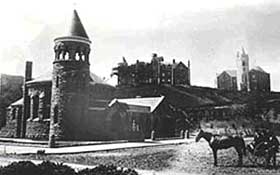
While he was serving St. John’s in Woodland, John Endter pursued postgraduate studies at the San Francisco Theological Seminary in San Anselmo. A history of the seminary published by James Curry in 1907, lists John Endter as a student in 1897. The seminary was founded in 1871 by Presbyterians in the Bay Area. In 1892 when they moved to the San Anselmo campus, they had a faculty of six professors and a student body of twenty.
In the 1900 federal census, Rev. John and Louise Endter were living in at 287 Cemetery Avenue in Woodland with their children Ruth, Anna, and Johannes. The children had all been born in Woodland while John was pastor at St. John’s.
The Archives of the Evangelical Synod at Eden Seminary show that in 1900, John Endter served as vice-president of the Pacific District of the synod.
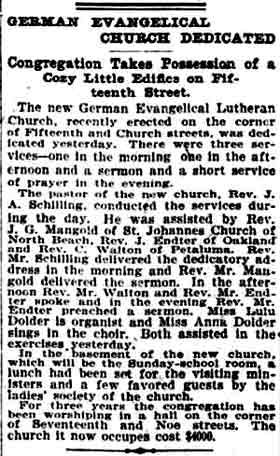
In 1900, John Endter became the pastor of St. Mark’s German Evangelical Lutheran Church on Filbert Street, between Seventh and Eighth Streets, in Oakland, Alameda, California. He served there from 1900 to 1903. Apparently, that congregation has not survived.
Pastor Endter participated in the founding of a new German Evangelical congregation in San Francisco in 1900. The article to the left appeared in the “San Francisco Call” newspaper on October 15, 1900.
Louise Endter gave birth to their son Theodor in Oakland, California in 1903.
parish in Kansas
Rev. John Endter’s next parish was in Kansas. The Eden Seminary Archives show that he was pastor of an Evangelical congregation in Nickerson, Reno, Kansas from 1903 to 1911. Family sources have said that this church was known as the “Little German Church.” However, I haven’t been able to find a record of this congregation.
The Eden Archive records also show that he was concurrently pastor of St. Peter Evangelical Church in Inman, McPherson, Kansas. However, based on Kansas state census records, the family residence was located in Nickerson.
births, deaths and remarriage
On September 14, 1904, Louisa Endter gave birth to twin daughters Esther and Gertrud in Nickerson, Reno, Kansas.
A 1905 Kansas census shows the “Johnas Endter” family residing in Nickerson.
On June 3, 1906, their last daughter Martha was born in Nickerson. She died 16 months later on October 8, 1907. Five months later Louisa was also dead.
Louise Emilie (Sagner) Endter died at age 45 on March 28, 1908 in Nickerson, leaving behind six children ages 11, 9, 8, 5, and a pair of 3-year-old twins.
The 1910 census record was difficult to find because the enumerator spelled the last name as “Endler”. His sister Juline, or Julia, (36) was living in the household to help with housework and the children. In addition, John’s mother-in-law Ernestine Sagner (67) was also living with the family. The address was 134 Peabody in Nickerson.
Sometime after 1910, Rev. John Endter remarried in Kansas. We have no record of the wedding date and only know that his second wife was named Bertha Meta Minnie Jennrich, the daughter of a pastor. She was born in Illinois on October 14, 1876.
parishes in Texas and Oklahoma
From 1911 to 1914, John Endter served at St. Johannes Evangelische Kirche bei Manor (St. John Evangelical Church in Manor) at Manor, Travis, Texas founded in 1878. The congregation was originally an Evangelical Lutheran parish served largely by Lutheran ministers for nearly a decade and a half, before becoming a part of the Evangelical Synod of North America in 1892.
Today, this congregation is Saint John Evangelical Lutheran United Church of Christ, 17701 Cameron Road, Richland, TX 78660-8917 (512-251-4314) (No current pastor – no email address).
In 1913, while in Texas, John Endter became a naturalized citizen of the United States.
From 1914 to 1915, Pastor Endter served at Friedens Evangelical Church in Kingfisher, Kingfisher, Oklahoma, which was organized by the German Evangelical Synod in May 1900.
On January 6, 1951, the Kingfisher Presbyterian Church and Friedens Evangelical and Reformed Church merged to form one congregation that is now actively related to both the United Presbyterian Church in the USA and the United Church of Christ. Today, this congregation is known as the Kingfisher Federated Church, 400 W. Fay Street, Kingfisher, OK 73750 (405-375-3336).
additional parishes in Kansas
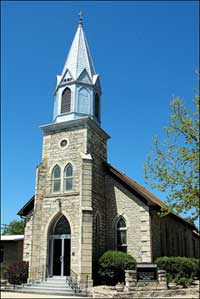
In 1915, Pastor Endter moved to the German Evangelical Peace Church in Alma, Kansas, which was founded in 1879. Alma, the seat of Wabaunsee County, is a small community rich in German heritage.
The church was erected in 1881 from native Kansas stone. The bell and tower were added in 1897. Today, it is Peace United Church of Christ, 221 Grand Avenue, Alma, KS 66401 (785-765-3818).
The Archives of the German Evangelical Synod indicate that Pastor Endter served the congregation from 1915 to 1921. The current pastor reports that church records show that John Endter was definitiely there from 1916 to 1920.
The archives of the Evangelical Synod also show that from 1916 to 1920, John Endter served as the secretary of the Kansas District of the synod.
The 1920 federal census shows that John (54) and Bertha (43) Endter were living in Alma, Kansas at that time. According to the census, was a minister of the Evangelical Synod. In the household were Anna L. (21), John L. (19), Theodore G. F. (17), Esther G. M. (15), Gertrude C. E. (15). Daughter Anna was a teacher in a public school. His son John was a general laborer.
In 1921, he moved his family to Herndon, Rawlins, Kansas where he was pastor of Immanuel Evangelical Church. According to an online history of Herndon:
“The religious needs of Herndon people continue to be served by St. Mary’s Catholic Church and the Immanuel United Church of Christ. Both had their beginnings in the late 19th century. A third church, the German Congregational Church also started up in those times but fell by the wayside after a few years of existence.”
Immanuel United Church of Christ, which was founded in 1887 in Herndon, looks like a good candidate as the congregation that he served. Today, it is Immanuel United Church of Christ, RR2 Box 97, Herndon, KS 67739-9514, (785-322-5284).
In a 1925 Kansas census, John (60) and Bertha (51?) Endter were living in Herndon, Rawlins, Kansas. He was an “I-P pastor.” No children were left in the household.
Later in 1925, John Endter took the call to the German Evangelical Peace Church founded in 1885 in Hudson, Stafford, Kansas where he remained until 1936. The family lived in Hayes Township based on 1925 Kansas census records.
The Peace Church was the only church in Hayes township until 1914, when members of the congregation living in Hudson formed their own church which was called the Trinity United Church of Christ.
In the 1930 federal census, John (65) and Bertha (53) were living in Hayes Township, Stafford, Kansas. He was pastor of a rural church. Pastor Endter would have been about 71 years old when he finished his service at Peace in 1936.
He did not end his ministry there, however. His final parish was Saint Paul Evangelical Church in Powhattan, Brown, Kansas which he served from 1936 to 1942. He ended his active ministry at the age of 76 or 77.
retirement and death
John Endter died eight years later in March 1950 at age 84 in Milwaukee, Milwaukee, Wisconsin.
Bertha (Jennrich) Endter died on September 15, 1969 in Bensenville, DuPage, Illinois.